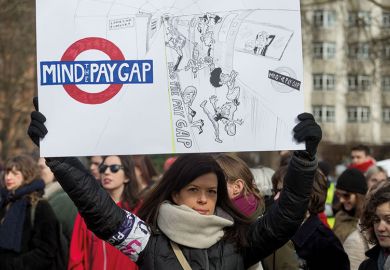The ongoing gender pay differentials announced last week by the BBC were disappointing given that UK law guarantees women the same pay as men for doing equal work or work of equal value. However, the fact that those differentials have come down markedly since figures for high-earning individuals at the broadcaster were first published last year is testament to the collective action that women at the broadcaster have taken to enforce their rights.
Nor are they alone. Women at Birmingham City Council and retailers such as Morrisons, Asda, Tesco and Next have all pursued collective legal action to claim equal pay. And feminists at Birkbeck, University of London, have recently begun following their example – backed up by a major law firm famous for winning high-profile equal pay cases.
Average pay for men is higher than for women at many universities because of pervasive gender differences in starting salaries and promotion rates. These arise because the deans and heads of department who award them are typically biased – consciously or otherwise – towards men. But what matters legally is whether men and women do “equal work” or “work of equal value”. The answer is typically, yes. They have to meet the same performance targets and are required to have the same prior experience and achievements to get their jobs in the first place.
In many UK universities, workload is evenly distributed regardless of gender or seniority. For example, women paid a lecturer’s salary are often expected to teach the same number of modules, lead the same number of courses and publish as much as men paid at higher senior-lecturer rates.
Making an equal pay claim requires the woman or women affected to write to their university human resources officer responsible for equality issues, asking for a reimbursement of the difference between their pay and that of a male comparator paid more to do equal work in the same institution. Only one comparator is required, from anywhere in the university, and their job title or staff grade is irrelevant if, in practice, they have similar job responsibilities and experience, and add the same “value”, such as tuition income, to the university.
Claimants can request backdated compensation for up to six years, and if the university is not forthcoming after independent attempts at arbitration, they can take the case to a tribunal, with the help of an employment solicitor on a no-win-no-fee basis.
Some universities wheel out excuses, such as claiming that women’s lower average pay is the result of maternity leave or career breaks. Apart from the fact that women should not be penalised for making such choices, such arguments are statistical hogwash. Many female academics are childfree, and many of those who go on maternity leave return within a matter of months, with no detrimental effect on their salaries.
Averages are irrelevant to equal pay claims, but they do speak volumes. According to figures from the Higher Education Statistics Agency, the average academic gender pay gap across English universities was 10.5 per cent in 2015-16. At Birkbeck, female academics were paid £4,675 less than men. Elsewhere in the capital, the gender gap at Brunel University London was £6,584; at King’s College London, it was £9,508; and at City, University of London, it was £10,457. The list goes on.
Such figures are not small change. Across a career of 40 years, such disparities amount to a total average salary loss of £216,000 for women in England – and more than £400,000 at City. As a recently launched petition argues, that gap could be plugged in part by redistributing money from the exorbitant salaries paid to senior managers – which are often in this range for just one year.
The push for equal pay is not an attack on male university staff. The majority have no say over women’s starting salaries or promotions, and many are supportive of the campaign. But, ultimately, it is up to women to join together to mount equal pay claims. Without that, the inequality will surely continue.
The author is an academic at Birkbeck, University of London. Academic and support staff at Birkbeck interested in joining the collective equal pay claim can email academicfeminists@gmail.com.
POSTSCRIPT:
Print headline: Join forces
Register to continue
Why register?
- Registration is free and only takes a moment
- Once registered, you can read 3 articles a month
- Sign up for our newsletter
Subscribe
Or subscribe for unlimited access to:
- Unlimited access to news, views, insights & reviews
- Digital editions
- Digital access to THE’s university and college rankings analysis
Already registered or a current subscriber?






